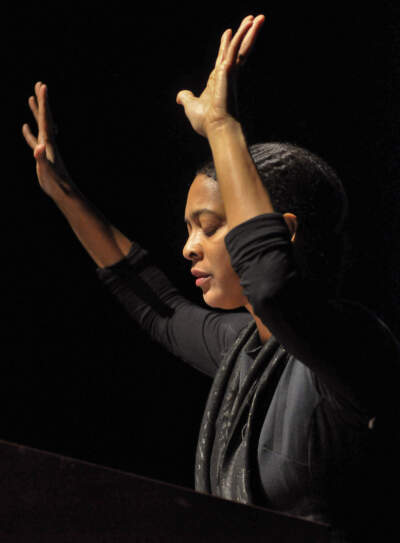Advertisement
Remembering former Boston Poet Laureate Danielle Legros Georges
Editor's Note: This story is an excerpt from WBUR's weekly arts and culture newsletter, The ARTery. If you like what you read and want it in your inbox, sign up here.
Former Boston Poet Laureate Danielle Legros Georges died on Feb. 11 in Dorchester at the age of 60. Her partner, Tom Laughlin, and her brothers Gerard, Bernard and Stephan were by her side, according to her obituary.
The award-winning poet rose before the sun to write, according to an interview with Mass Poetry. She found inspiration at daybreak. “With coffee and quietude,” she said. “And dawn approaching.”

In 2015, Legros Georges became the city's poet laureate, the second ever to hold the position. Catherine Tung, Legros Georges’ editor at Beacon Press, called the late poet a “quiet revolutionary spirit” in an online dedication.
Perpetua Cannistraro, Legros Georges’ publicist, remembered the poet for the way she paid careful attention to the world around her. “Danielle’s work serves to set Haitians free from the darkness of fear-filled stereotypes and shines a magnificent light on the diversity of Haiti’s population,” Cannistraro wrote in the same dedication. “Her words inspire me to embody that drive for freedom that makes me Haitian—that makes me human.”
Legros Georges’ words drew Haiti closer. Her words drew on her life experiences as a Haitian living in the diaspora. Legros Georges was born Feb. 14, 1964, in Gonaïves, Haiti, to parents Rodney and Edmonde Legros Georges, an engineer and secondary school teacher, according to her obituary. Her parents first moved to the Democratic Republic of Congo before ultimately settling in Mattapan.
Advertisement
In “Poem for the Poorest Country in the Western Hemisphere,” she paints the Haiti she knew best:
“O poorest country, this is not your name.
You should be called beacon. You should
be called flame. Almond and bougainvillea,
garden and green mountain, villa and hut,
girl with red ribbons in her hair,
books under arm, charmed by the light
of morning, charcoal seller in black skirt,
encircled by dead trees…”
She was revered as an author, professor, academic, translator and friend to other poets who felt honored to read alongside her. She had invited Charlot Lucien, her longtime friend and founder of the Haitian Artists Assembly of Massachusetts, to join her at her last public reading in late January, just weeks before she passed.
“I heard Danielle, being Danielle, gently asking a member of the audience ‘If I may, can you tell me more, can you define what you mean by authenticity?’” he said.
The exchange reminded Lucien of a similar moment 23 years ago, when Legros Georges challenged him to define his own “Haitian authenticity” in a conversation about poetry and storytelling. Lucien wrote in an email: “Danielle often led artists to rediscover themselves, and took readers to unexpected heights to relentlessly explore new, larger dimensions of Haitian art, and ultimately new dimensions of Haiti as a sacred cultural and historical landmark.”
Two years ago, she was selected to contextualize the identity of 30 Haitian artists in the introduction of the upcoming Haitian art anthology "Who We Art: Haitian Art in New England,” which will be out this summer. Lucien said they now plan to include a tribute to her memory.
“Along with her friendship and the immanent quality of her poetry, I have especially cherished Danielle’s generosity with her time,” wrote Eddy Toussaint Tontongi, editor-in-chief of Trilingual Press, in an ode to the poet he shared with WBUR.
“She unfailingly participated or showed up for every invitation I extended, be it to read at a poetry event or contribute to an anthology. She contributed not only her own work, but also enriched this volume with works by other poets, including translations of her uncle's work, the great Haitian guru and poet Jean-Claude Martineau.”
Legros Georges was a professor and director of the MFA in Creative Writing program at Lesley University. She retired in 2023 as a professor emerita, according to her obituary.
Cambridge’s Poet Populist Emeritus Toni Bee still remembers lessons she learned in class over a decade ago.
“I respected her work,” Bee said. “I respected the language, the intent of the language that she used, and I felt it every time she spoke, every time she taught, and every time she read.”
Local writer and educator Nakia Hill said Legros Georges’s work made her feel seen. She said it was always an honor to be invited to read alongside her.
“She was one of those artists that would make space for other poets. And I could imagine that she was the same way for her students too,” Hill said. “She would let you speak. She would listen, and when she spoke she left a trail of gems.”
Mass Poetry is planning a tribute to Legros Georges at the 2025 Massachusetts Poetry Festival at the end of May. Later this year, visitors to Copley Square will be able to view Legros Georges’ poem “How Many Kinds of Love” in a new artwork commissioned by the Mayor’s Office of Arts and Culture later this year.
Her most recent book, “Three Leaves, Three Roots: Poems on the Haiti-Congo Story,” published Jan. 14. And a final poem, “To Sew A Freedom Suit,” is featured in the March 3 print edition of The New Yorker.
